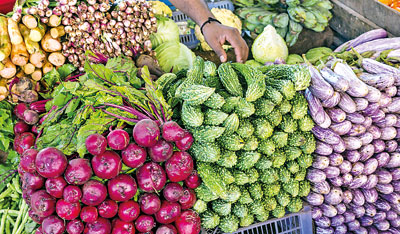Staple rice based diet changing in South Asia, experts say

File picture of a vegetable market
The mindset of Sri Lankans and the government’s policy is to produce more and more rice instead of switching to other cash crops to improve nutrition and economic benefits of its people although agricultural transformation is taking place elsewhere in the region, said P.K. Joshi, Director of South Asia International Food Policy Research Institute (IFPRI).
Addressing a media briefing at the Institute of Policy Studies (IPS) in Colombo last week, he said the demand is changing fast in other commodities for fruits, fish meats and vegetable diet, although the mindset of the Sri Lanka government is focused mainly on producing more and more rice with subsidies given to farmers.
“We have an obsession for food security but we have to gradually move onto food safety issues to improve overall health of its people. We cannot compromise with unsafe food. Although transformation is taking place elsewhere in this part of the region, Sri Lanka has to learn a lot from other countries to move away from a rice-based economy that would also help farmers to earn more. However all support programmes of the government is based on producing more rice,” he said.
Mr. Joshi said that two things are necessary to help farmers to increase their productivity by switching on to remunerative crops. Farmers cannot earn more by growing more rice while the second aspect was that when farmers operate independently the transaction cost become high and to overcome this problem farmers need to form cooperatives or organisations to sell their products or to link with supermarket chains to export their products.
The high cost of production is attributed to the small land holding of framers. Although Sri Lanka is an agricultural based country during the past it has now been integrated with the global markets by engaging in import and export trade.
IFPRI Director General of International Food Policy Research Institute Shenggen Fan said, ”We are working very closely with national governments, national research agencies, policy think tanks to provide data with research based evidence for governments to make the right decisions to eliminate hunger and nutrition issues. The 2017 global food policy report is focused on urbanization and nutrition security.”
He said half of the world population now live in cities. By 2050, 66 per cent of the people will live in cities. This will happen in Sri Lanka too as people are moving into cities to engage in non farming activities. When people move into cities they will have access to diverse type of foods that will improve nutrition.
Referring to the negative aspect of urbanization, he said when people are pushed into cities they will be forced to live in slums deprived of clean drinking water and good food.
According to the two IFPRI experts, Sri Lanka has made great strides in reducing hunger and poverty in recent years by rapid urbanization providing new challenges and opportunities to achieve sustainable development goal of eliminating hunger by 2030.
IFPRI was set up after the first world food crisis to respond to demands from several countries and has been working with many developing countries in Africa and South Asian countries like India, Pakistan, Sri Lanka, Bangladesh and in East Asian Countries like China, Vietnam, Cambodia, the Philippines and Indonesia.
“Urbanization is driving huge change in how small farmers connect with markets to sell their goods and choices people make about their diets and the way how food systems are governed. Although Sri Lanka is a front runner in South Asia on most issues of food safety, proper implementation of food safety regulations remains a problem,” said Mr. Fan.


